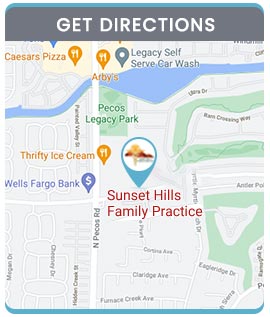Allergy Testing Clinic in Henderson NV
Many people, in various phases of life, are affected by allergies. More than 50 million Americans suffer from allergies. Allergy testing identifies allergens such as pets, mold, and peanuts that may cause allergies. This condition develops when the immune system overreacts to specific substances. If you experience the symptoms of allergies such as headaches, sore throats, runny noses, itching, watery eyes, and shortness of breath come to us we help you find the cause and eliminate the worst symptoms. Our healthcare professional allergists specialize in diagnosing and treating all types of allergies. If you are looking to help, get a diagnosis or treatment for an allergy, contact us today or schedule an appointment online. We are located at 2510 Wigwam Pkwy Suite 102, Henderson, NV 89074.


Table of Content:
What is allergy testing?
What are the types of allergy tests?
How do I know if I need an allergy test?
How long does allergy testing usually take?
Allergies are a common health problem that affects millions of people worldwide. If you live in Henderson, NV, and are experiencing allergy symptoms, you may want to consider visiting an allergy testing clinic.
Allergy testing is a medical procedure that helps identify allergens that cause symptoms. When you visit an allergy testing clinic, the doctor will ask you about your symptoms and medical history. Based on this information, they will recommend a specific type of allergy test. Once the test is completed, the doctor will review the results and develop a personalized treatment plan for you. Allergy testing is important because it can reduce the risk of severe allergic reactions and help you manage your symptoms more effectively.
At the allergy testing clinic in Henderson, NV, three main types of allergy testing are available: skin prick test, blood test, and patch test. The skin prick test involves placing a small number of allergen extracts on the skin and then pricking the skin to allow the allergen to enter the body. The blood test involves drawing a sample of blood and testing it for allergen-specific antibodies. The patch test involves placing small amounts of allergen extracts on the skin and then covering them with a patch for a few days to see if a reaction occurs.
If you are experiencing allergy symptoms, such as sneezing, itching, or hives, you may need an allergy test. The severity of your symptoms will determine whether you need to visit an emergency clinic or not. You should seek emergency medical attention immediately if you have severe allergies, such as anaphylaxis. If you have moderate or mild allergy symptoms, you may want to consider visiting an allergy testing clinic to determine the cause of your symptoms and develop a treatment plan.
There are several different types of allergies, some are common, while others are not, the most common types of allergens which are responsible for allergic reactions include:
Seasonal allergies
You may have seasonal allergies if you sneeze or cough during certain times of the year. Throughout the United States, trees bloom in spring. Tree pollen season runs from late February to early June, followed by summer grass season. Many people are allergic to ragweed and weeds in the fall.
Drugs and Medications
Drug reactions are relatively common. However, these reactions can vary in severity. One person may develop a rash and/or swelling, while the other may have difficulty breathing. Typically, 5% to 10% of drug reactions are due to an allergic reaction to the drug. The drugs that produced the most common reactions were: antibiotics (penicillin), aspirin/NSAIDs, chemotherapy, monoclonal antibody therapy, and anticonvulsants.
Food allergies
Most food allergies occur in childhood, but food allergies can also develop in adulthood. The foods that cause most food allergies in adults are fish, peanuts, shellfish, and tree nuts. A food allergy is different from a food intolerance. A food allergy is when the immune system overreacts to proteins in food. Allergic symptoms may appear immediately after ingestion. Allergic reactions to food can be life-threatening. People with food allergies need to take special care to avoid foods to which they are allergic.
Latex
Latex is not as common as it used to be. Latex is found in rubber gloves, condoms, balloons, toys, and rubber bands. It is a substance produced by rubber trees mixed with chemicals during manufacturing to give it its elasticity.
Mold
There are hundreds of species of mold, and not all molds cause allergy symptoms. Mold is tiny fungal spores that live in the air. Mold thrives in damp environments and can be found indoors or in other buildings as well as outside. Everyone is exposed to spores that float in the air. But not everyone reacts to mold. An allergic reaction to mold can cause coughing, itchy, stuffy eyes, and other allergy symptoms that lead to a horrible feeling. Mold allergies have been linked to worsening asthma; prolonged mold exposure can narrow the airways and cause breathing difficulties. Alternaria, Aspergillus, Cladosporium, and Penicillium are the most common allergenic molds.
Animal hair
Allergies in pets are common. Cat allergies are more common than dog allergies. The source of cat and dog allergens is their saliva, urine and dander, not their fur.
Pet dander is the tiny flakes of dander that pets shed. Pet dander is commonly found on cats and dogs, but can also come from any animal with fur. Allergic reactions to pet dander include sneezing, runny nose, wheezing and difficulty breathing, and in worse cases, trigger asthma symptoms. It is best to avoid contact with animals that cause allergies as much as possible. People who are allergic to animal dander can develop a skin reaction called dermatitis from direct contact.
Insect Venom or Stings
Most people experience swelling, redness, and itching after an insect bite. People allergic to the venom experience more severe symptoms because their immune systems overreact to it. When you are bitten by an insect, your body produces antibodies called immunoglobulin E (IgE). If you are bitten again by the same insect, the IgE will react to the venom and trigger an allergic reaction.
Usually, a nurse performs the test and a doctor interprets the results. The test usually takes about 20 to 40 minutes. Some tests detect immediate allergic reactions that occur within minutes of exposure to an allergen. Other tests detect delayed allergic reactions that occur over several days.
If you live in Henderson, NV, and are experiencing allergy symptoms, you may want to consider visiting an allergy testing clinic. The clinic offers various types of allergy testing, including skin prick tests, blood tests, and patch tests. Allergy testing is important because it helps identify allergens that cause symptoms, reduces the risk of severe allergic reactions, and helps develop a personalized treatment plan. If you are experiencing allergy symptoms, it is important to seek medical attention to determine the cause of your symptoms and manage them effectively, contact us or schedule an appointment online. We are located at 2510 Wigwam Pkwy Suite 102, Henderson, NV 89074. We serve patients from Henderson NV, Paradise Hills NV, Winchester NV, Gibson Springs NV, Midway NV, and surrounding areas.




